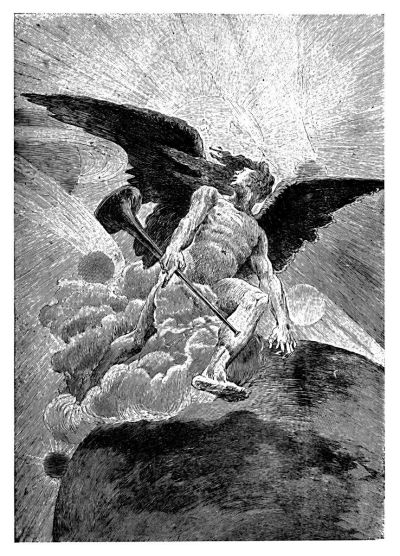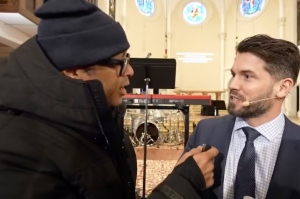Revelation 14: The fate of the 144,000

In Revelation, especially chapters 11-13, the rise of evil forces in the end times is prophesied. These powerful forces, specifically the Antichrist and his False Prophet, deceive the world and establish dominance and control over humanity.
Two witnesses are said to be able to strike the earth with plagues, control the weather, and consume their enemies with fire. Eventually, they are murdered, and their martyrdom is followed by their resurrection and ascension for the whole world to see.
Because of the life and ministry of these two witnesses, innumerable people from Israel and other nations believe in Christ. However, the Antichrist and the False Prophet put in place a scheme requiring people to be marked with their number. Without this number, they can neither buy nor sell, and those unwilling to bow in adoration and devotion to the Antichrist are pursued and slain.
The Mark of the Beast (Antichrist) is described as being required on the right hand or the forehead. Although the number of this mark, 666, has been subject to various theories and debates throughout history, it clearly sets apart the damned from those who will be saved. It also jogs the memory of another group of individuals who, in contrast, were sealed by God on their foreheads, the 144,000 (Revelation 7:1-8). The mark of the 144,000 signifies their redemption and faithfulness to God amid terrible Tribulation, and it also provides them with divine protection until their God-given mandate is completed.
The ministry of the 144,000 Messianic Jews chosen from the 12 tribes of Israel has them zealously and powerfully proclaiming the Gospel of Christ, warning people of God’s impending judgment, and calling humanity to repentance. Their role has been crucial. Until chapter 14, nothing has been said about their fate.
Revelation 14 supplies the answer. The Scriptures say:
“Then I saw the Lamb standing on Mount Zion, and with him were 144,000 who had his name and his Father’s name written on their foreheads. And I heard a sound from Heaven like the roar of mighty ocean waves or the rolling of loud thunder. It was like the sound of many harpists playing together.
“This great choir sang a wonderful new song in front of the throne of God and before the four living beings and the 24 elders. No one could learn this song except the 144,000 who had been redeemed from the earth. They have kept themselves as pure as virgins, following the Lamb wherever he goes. They have been purchased from among the people on the earth as a special offering to God and to the Lamb. They have told no lies; they are without blame.”
So, what happened to the 144,000? Were they ultimately martyred? Were they, in due course, miraculously rescued? The book of Revelation doesn’t say, leaving their exact fate somewhat ambiguous. Nevertheless, it does say that they are preserved and end up standing before the Lamb on Mount Zion.
Mount Zion holds both physical and symbolic significance throughout the Bible. Mount Zion is literally a hill located in Jerusalem, physically elevated and representing a position of prominence and strength. In Old Testament times, Zion referred to a specific elevation on which the Temple of Jerusalem was built. It was the place of God’s dwelling among his people.
Beyond its physical location, Mount Zion represents the presence of God, God’s Kingdom, and the establishment of his ultimate reign over the entire earth. It is associated with joy, security, and the infinite bounty of the Lord’s blessings. The Psalmist writes, “It is high and magnificent; the whole earth rejoices to see it! Mount Zion, the holy mountain, is the city of the great King!” (Psalm 48:2). This verse points to the future reign of the Messiah, the Lord Jesus Christ, and the many Old Testament passages that prophesy the establishment of his Kingdom on earth and his reign from Mount Zion in Jerusalem.
Mount Zion can also be understood as a place of spiritual transformation in the human heart. Hebrews 12:22 reads, “[Y]ou have come to Mount Zion, to the city of the living God, the heavenly Jerusalem, and to countless thousands of angels in a joyful gathering. You have come to the assembly of God’s firstborn children, whose names are written in heaven. You have come to God himself, who is the judge over all things. You have come to the spirits of the righteous ones in heaven who have now been made perfect.”
John Owen, the tremendous Puritan preacher of the 1600s, wrote of this text from Hebrews, saying:
“Believers come to Mount Zion, that is, unto that state wherein they have an interest in and a right unto all the blessed and glorious things that are spoken in the Scriptures concerning Mount Zion, the place of God’s special gracious residence, of the throne of Christ in his reign, the subject of all graces, the object of all promises, as the Scriptures abundantly testify … It is the city of God, of the true and only God, who is omnipotent and able to keep and preserve. It is the heavenly Jerusalem, for it is not of this world, and no small part of its inhabitants are already actually instated in Heaven. It is 10,000 times more glorious to be a citizen of this city than of the greatest city in the world.”
How fantastic is the knowledge that when one genuinely trusts in Christ as Savior and Lord, that person immediately becomes a citizen of the Kingdom of God and is bound for heaven forever more.
Perhaps one of my most memorable experiences as a pastor was visiting one of my parishioners in the hospital. He was scheduled for serious heart surgery and was understandably anxious about it. He was to the point of tears as he told me his fear that he might not survive the operation.
At this point, I asked him pertinent questions about his soul and relationship with God. He made it clear that he genuinely had given his heart to Christ and was sure of it. I replied, “Well, that being the case, you mustn’t worry. Because no matter whether you survive the surgery or not, everything is going to be alright. Everything will be alright if you live and God grants you additional years. If something happens during the procedure and you die, you will be immediately with the Lord, and that will be alright, too.”
Over and again, he began repeating the phrase, “No matter what, it’s going to be alright. No matter what, it’s going to be alright.”
He survived the surgery and did well for many years after that. Indeed, everything was alright. That was his testimony to the church and his friends of what he had learned. No matter what happens, it will be alright for those who have trusted in Christ.
It may not be clear what happened to the 144,000 during the Tribulation, but in the first verses of Revelation 14, it is apparent their mission is finished, and it can be seen that everything is more than alright for them.
Some scholars think the 144,000 are standing before the Lord during Christ’s future earthly Kingdom. Others think they are standing before him in the heavenly Jerusalem.
What are the 144,000 doing before the Lord? They are worshipping him and singing a praise song pertinent only to them.
O, how deep and broad is the subject of worship! Saint Augustine of Hippo said of God, “You have made us for yourself, O Lord and our heart is restless until it rests in you.”
Worshipping God is a fundamental aspect of human nature. Human beings find their ultimate fulfillment and satisfaction in a relationship with God.
During this scene of heavenly praise and adoration, John heard a voice similar to the sound of many ocean waters and great thunder. John described the magnificent sound of God’s voice as the mighty waves of the ocean and thunder.
When I was a boy, if a thunderstorm arose, I was taught by my grandparents and the people of their generation that we were to find some place to sit down in the house, be quiet and show reverence, for the Lord was speaking in the thunder. I’m not saying this should necessarily be taught to children today. (Although I don’t think it would hurt them.)
My point, however, is there is nothing quite like the sound of thunder in the natural realm. It has a distinct and ominous quality, carrying with it a sense of awe and energy. It can be deep and base-heavy. It can range from a faint, distant grumble to a loud, explosive boom. Its raw power can produce a vibrating effect that sometimes can be felt to the bone and shake one’s surroundings. The sound of thunder can be awe-inspiring or intimidating. It can evoke feelings of excitement or fearful anticipation.
For the 144,000, who were redeemed and safely in heaven, the voice of God, with its resonating rumble or clap, carried a majestic weight that transcended mortal comprehension. Its timbre possessed an indescribable richness that engendered the most profound form of worship, drawing an intense devotion and reverence from everyone in heaven.
“O Lord my God, when I in awesome wonder, consider all the worlds Thy hands have made; I see the stars, I hear the rolling thunder, Thy power throughout the universe displayed.
“Then sings my soul, my Savior God to Thee, How great Thou art, how great Thou art! Then sings my soul, my Savior God to Thee, How great Thou art!”
There is also the mention of harpists playing their harps, suggesting the accompaniment for the song of the 144,000 was out of this world! This worship service had a celestial context.
Although a church may not have heavenly harpists to play along while the choir sings or everyone sings a congregational hymn, worship here on earth can also be sweet, stirring, and divine.
Dr. Jerry Vines, pastor Emeritus of the First Baptist Church, Jacksonville, Florida, used to tell this story:
“A deacon I know dreamed that an angel took him to the worship service in his church. The building was filled with people, but when they sang the congregational hymns, he couldn’t hear a sound. When the choir sang its number, there wasn’t a sound. When the preacher preached the sermon, there wasn’t a sound. The deacon looked at the angel and asked, ‘What’s wrong?’ The angel replied, ‘[T]hese people are worshipping God with their lips but not with their hearts.’”
Worship can only take on the divine when it’s from the heart. When going to some place of worship, we shouldn’t just sit and expect the music or the preaching to move us. We should stir up our own souls! In Psalm 103:1-2, the Psalmist directs his own soul, saying, “Let all that I am praise the Lord; with my whole heart, I will praise his holy name. Let all that I am praise the Lord; may I never forget the good things he does for me.”
But we should also understand that there has never been any perfect worship in this world. What is described in Revelation 14 is just a glimpse of that better and perfect life promised where God’s people worship fully without effort and in complete perfection. God hasten the day!
Revelation 14 says the 144,000 sang a song they could only identify with and learn.
One Sunday, a college student went with me to church. He had not grown up in a family that attended church regularly. When we stood to sing the hymns, I didn’t use the hymnal but sang each one happily from memory.
While singing, he asked me, “Do you already know all these hymns?” I responded, “Yes, I know most of them. Although I certainly don’t remember all the words.” He seemed a bit astonished.
Yet, I don’t believe my knowledge of the hymns was what caught his attention. I think it was mainly that he didn’t understand the hymns we sang. He couldn’t identify with them, and learning their deepest meaning was impossible for him because he had never come to know Christ.
The 144,000 who stand before the Lamb in worship are said to be “virgins.” Is this to be taken literally or figuratively?
The late Charles C. Ryrie, in his commentary on Revelation, suggests:
“Although this could be understood to mean that these people were never married and therefore undistracted in their work for God (as in I Cor. 7:32), it also can mean that they were completely separated unto the God they served. The word ‘virgin’ is used this way of married Corinthian believers in 2 Corinthians 11:2.”
The best interpretation seems to be that married people are the rule. They generally embody what God intended for humanity, while the 144,00 are the exception to the rule. They are more like the Lord Jesus was himself.
With the utmost devotion, they have followed the Savior faithfully while on the earth, and now they follow him in glory.
They are a special offering to God, the “first fruits” as some translations render it – an agricultural concept among the Hebrews, where the first portion of their harvest was dedicated to God. Depicted as coming from Israel’s 12 tribes, the “first fruits” symbolize a future great harvest out of Israel who will repent of their unbelief and receive the Lord Jesus during the Tribulation.
The 144,000 have told no lies. The message they preached was the unadulterated Gospel of Christ, and they are without blame. Not that they never sinned, but in a time of intense moral darkness, characterized by murders, sorceries (drug use), sexual immorality, thefts, deception, idolatry, and rebellion against God’s authority, they remained faithful to Christ.
They are not safe with the Lamb on Mount Zion in Revelation 14 because they did all these things. They did all these things because they had already been saved through faith in the precious blood of the Lamb.
We may not know precisely what happened to the 144,000 in life, whether in the long run, they were martyred, or like Shadrach, Meshach, and Abednego, they were delivered from the fiery furnace. However, at the end of their lives, their presence with the Lamb shows us that no matter what happens, for those who have trusted in Christ, it will be alright.
Rev. Mark H. Creech is Executive Director of the Christian Action League of North Carolina, Inc. He was a pastor for twenty years before taking this position, having served five different Southern Baptist churches in North Carolina and one Independent Baptist in upstate New York.



























